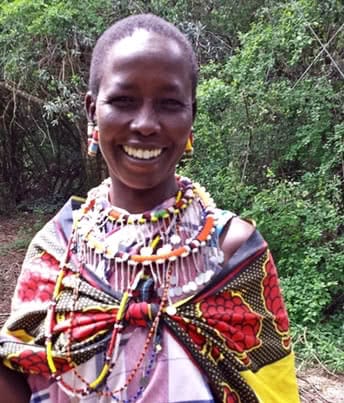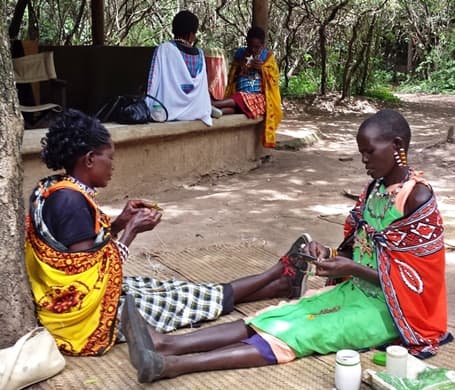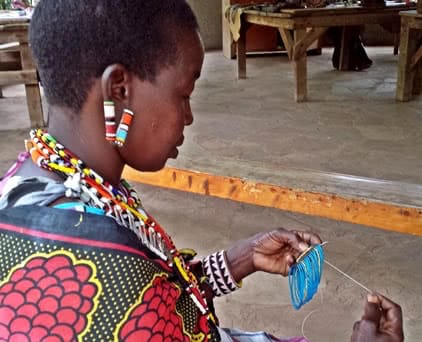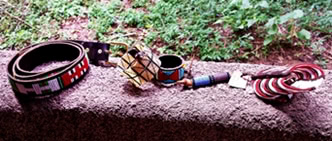by Leslie Vryenhoek
 Nalakiti Sayaiael has a slow but fierce smile, punctuated by the custom-made gap in her lower set of teeth. As she shares her story in Maa, the local language, that gap forms part of the sound. Her hands, meanwhile, stay in motion. She's finishing a bright blue bracelet that ties together her traditional beading skills and a new understanding about international markets. Blending new knowledge with old skills has led to a dramatic change in her household — and in her sense of self.
Nalakiti Sayaiael has a slow but fierce smile, punctuated by the custom-made gap in her lower set of teeth. As she shares her story in Maa, the local language, that gap forms part of the sound. Her hands, meanwhile, stay in motion. She's finishing a bright blue bracelet that ties together her traditional beading skills and a new understanding about international markets. Blending new knowledge with old skills has led to a dramatic change in her household — and in her sense of self.
Nalakiti lives in Talek, a community adjacent to the Maasai Mara National Reserve in southern Kenya. Although separated from Kenya’s urban areas by rough, unpaved roads, the place and its people are being transformed by external forces. More frequent and severe droughts in this semi-arid region, for example, threaten subsistence livelihoods based primarily on rearing livestock, particularly cattle. Meanwhile, grazing areas are limited by a conservancy movement that sees the Maasai trade parcels of land to outside interests in exchange for regular payments. Add to this mix a growing tourism industry, which imposes new customs to satisfy tourist preferences.
According to the Maasai Association, over the past thirty years the economy here has grown increasingly connected to global markets. In 2003, Basecamp Maasai Mara, an eco-safari enterprise operated by the Norwegian company Basecamp Explorer, opened here. It sought to provide local employment while helping preserve local nature and culture. The tourism company also set up a foundation to support community projects, including schools, hospitals and a handicraft enterprise. That enterprise, Basecamp Maasai Brand (BMB), gives women an opportunity to make and sell traditional beaded crafts in a global marketplace.

The women who produce for Basecamp Maasai Brand say learning to do things better has improved their lives. They too have spent their increased earnings on livestock, on more functional homes, and most especially on education for their children.
In 2013, a project called Leadership & Business Skills for Informal Women Workers in Fair Trade was implemented by BMB, to help its handicraft producers improve their livelihoods. The project, led by WIEGO in partnership with the Kenyan Federation for Alternative Trade (KEFAT), provided training in women’s leadership, business and finances, organizational governance, and women’s economic rights.
Nalakiti is one of the women who benefitted from these trainings. She believes the project taught her to be a leader, allowing her to overcome shyness and help other women learn to earn a living. And in 2014, her newfound confidence helped her win election as the chair of BMB, which has grown into a 120-member community-based organization (CBO).
According to Jemimah Lenjirr, BMB's coordinator, the group has officially registered with the Kenyan Ministry of Gender Children and Social Development. Registration brings benefits, Jemimah explained, by making a group more visible and offering access to government funds.
Registration brings benefits, Jemimah explained, by making a group more visible and offering access to government funds.
“The women have a voice as a group,” she says. “When you are alone, you cannot claim your rights. But when you are together, you can negotiate.”
But the new identity brings worries, too. In a move to promote sustainability and independence, the foundation ended its financial support for women's enterprise last year, although it continues to offer free use of an Art Centre and office on its site. Now, to pay salaries to Jemimah and two other staff and to cover expenses, BMB must rely on its sales.
Securing Better Livelihoods
Currently, buyers come from Europe and the USA. Most place orders through an online catalogue, though some ask for custom designs. BMB also sells products on consignment in some of Nairobi’s gift shops.
Women producers pay no membership fee to belong to the organization. Instead, their buy-in is the skill they bring to make the products that BMB sells. They are paid on a piece rate as subcontracted producers. BMB provides the beads and other material, and instruction on new designs. However, while the women start working on new items at the Art Centre, much of the work is done in the women's homes, where many also produce their own products to sell independently.
 In the past two years, training in new techniques and quality management, alongside basic business skills and financial topics like saving and diversifying their income, have bolstered both BMB and individual earnings.
In the past two years, training in new techniques and quality management, alongside basic business skills and financial topics like saving and diversifying their income, have bolstered both BMB and individual earnings.
Because BMB is Fairtrade certified, it pays a fair price for the work the women do. This gives the producers a sense of security. In fact when she was nearly finished her bracelet, Nalakiti held it up and said, “When I’m beading this, I know how much I will get for this product.”
Her earnings from the work are now significant—about 20,000 Kenyan shillings every two months. This has allowed her to improve her household and to share in the cost of schooling her five children. Nalakiti’s husband also contributes to the family expenses, but his income from cattle farming is not high and he has three other wives with children to support.
Nalakiti has built a bigger, more modern house and bought a water tank, and recently a group of the women went together and each bought a gas cooker for 5,000 Kenyan shillings. The cookers save time. Now if Nalakiti is delayed with work, she said, she can prepare the evening meal without having to take time to fetch wood and make a fire.
She has also reinvested her earnings to diversify her income. Once she came to understand that she could own property—ownership and other rights were also part of the training—she purchased cows and sheep. These give her additional income streams.
Many of the women who had gathered also talked of how much it has meant
to them to learn to do things better. They too have spent their improved earnings on livestock, on more functional homes, and most especially on education for their children.
“Women now are able to know that they can have their own money and have control over it. They can say ‘This money can take my daughter to school,’” said Jemimah.
One woman noted that what has really changed is the respect that the women are afforded in the community.
Bringing In More Women
Nalakiti echoed that, saying she is proud that she’s setting an example for other women to follow. Many women, she says, ask her if they can join.
However, it’s not that simple. “We have a waiting list of young women who want to join, but we need higher orders to absorb more,” Jemimah said, but added that all interested women in the community were welcome to attend the project trainings, regardless of whether they were members.
Following Maasai tradition, some younger members inherit their spot in the group. An older woman who can no longer efficiently make the products can hand over her spot to a younger woman—usually a daughter or daughter-in-law who has learned the skills. The older woman maintains the membership and receives 50 per cent of the income generated by the younger woman. Only upon the older woman’s death will the younger woman gain full membership.
